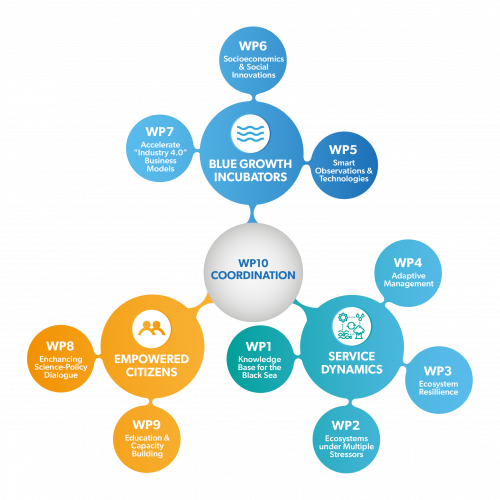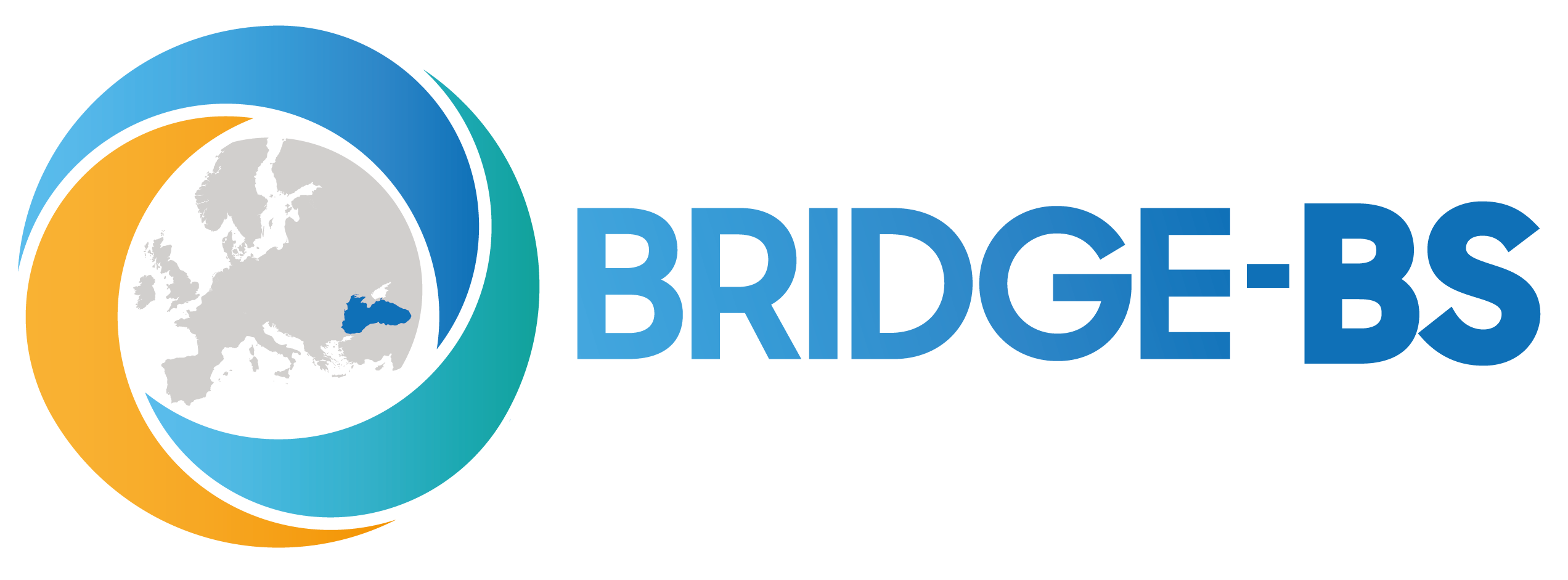WORK PACKAGES
BRIDGE-BS will advance knowledge and deliver research under three NODES: Service Dynamics, Blue Growth Incubators and Empowered Citizens. The NODES will be highly interlinked, feeding on and into each other.

KNOWLEDGE BASE FOR THE BLACK SEA
Objectives: To establish methods and tools for data harmonization, increasing the data readiness level, and generating the knowledge needed to assess ecosystem state, dynamics, and resilience, building on the past and ongoing projects/initiatives.
Specific objectives are:
- Increase readiness level at Basin-wide and Pilot Site scale for assessment and prediction of ecosystem services and resilience through assembling, integrating, and making compatible data from EU data infrastructures, partners’ data repositories, and new observations (WP5)
- Consolidate data integration through Black Sea BRIDGE-BS Portal and make data available using FAIR protocols, support project’s modeling, and analyses activities
- Support the harmonization of datasets, sampling efforts, assessment methodologies, including data integration from different sources and interoperability
- Provide aggregated socio-economic results through Blue Economy Observatories
ECOSYSTEM DYNAMICS UNDER MULTI STRESSORS
Objectives: WP2 will assess and predict the Black Sea state (physical, biogeochemical, and ecosystem components up to and including fish), ecosystem service dynamics, and crucial GES indicators under the impact of climate and non-climate stressors at Basin-Wide and Pilot-Site scales. It builds on an ensemble of state-of-the-art basin-scale and high-resolution regional modeling tools to reconstruct the history (back to 1960), assess the current state, and forecast future conditions under climate change (2100 horizon) and other anthropogenic stressors, including Blue Growth activities (10 to 20 years). Specifically, WP2 will assess, predict and project:
- Black Sea physical, biogeochemical, and ecosystem state under climate (warming, deoxygenation, acidification) and non-climate (e.g. eutrophication, invasive species, fishing, and selected Blue Growth activities) stressors including scenarios of changes of these stressors
- GES indicators supporting the implementation of MSFD, Bucharest Convention, and the UN Sustainable Development Goals
Ecosystem services under interacting multi stressors and Blue Growth Scenarios
RESILIENCE FOR A HEALTHY BLACK SEA ECOSYSTEM
Objectives: The main objective is to assess the resilience of the Black Sea ecosystems, and identify the key functions that provide for sustainable ecosystem service (ES) production under different socio-ecological conditions. The main WP3 output is a holistic resilience assessment of the Black Sea ecosystems, as relevant for the key ES sustainability. Such assessment will identify ecosystem limits to stress and provide direct input for defining the safe operating space and planning adaptive management in WP4, as well as the designing of sustainable transition pathways for Blue Growth in NODE2 (WP6 in particular). To achieve this, WP3 will use a hierarchical resilience analysis framework to:
- Test for pressure-state indicators that can be used to detect a change in ecosystem functions and state affecting the production of ecosystem services (ESs), and explore the link between multi stressors and the ecosystem properties and functions that contribute towards maintaining a healthy and resilient ecosystem
- Map the resilience landscape of different Black Sea ecosystems, and proximity of current ecosystem state to potential tipping points where sufficient data is available
- Develop methods and tools to assess ecosystem resilience in data-poor systems
Use scenario studies to explore ecosystem resilience and recovery times concerning different types of perturbation and project future resilience landscapes
ADAPTIVE MANAGEMENT
Objectives: WP4 will develop multi-stressor multi-service adaptive management strategies at basin and selected Pilot scales to boost sustainable Blue Growth (BG), limit human impacts on the Black Sea state, preserving its core ecosystem services (ES) by maintaining a safe operating space. Specific activities include:
- developing and applying the risk-based assessment and Decision Support Tools (DST) to identify the key environmental vulnerabilities and pressure-impact linkage chains relative to multi stressors
- estimating the cumulative impacts and risks on Black Sea state and core ES considering future scenarios and management decisions;
- developing adaptive management strategies to underpin sustainable BG in the Black Sea;
providing tools and knowledge supporting training and capacity building.
SMART OBSERVATIONS AND TECHNOLOGIES FOR TACKLING MULTI STRESSORS, BOOSTING INNOVATION, AND SUPPORTING MONITORING
Objectives: WP5 aims to provide new process knowledge to assess and predict the impacts of multi stressors on the Black Sea ecosystem resilience and ecosystem services, boost innovation potential and develop a multi stressors-based, Black Sea tailored observing/early warning system component. Specific objectives will be:
- Provide new process knowledge on service dynamics at BRIDGE-BS Pilot Sites to support NODE1 modeling, resilience, and DST activities
- Execute basin-wide process-oriented synoptic R/V expeditions to improve process understanding of stressor and service interactions concerning physical and biogeochemical redox processes
- Advance tailored applications of new cost-effective tools for understanding ecosystem functioning and rapid biodiversity assessments of high innovation potential
Advance Black Sea multi stressors monitoring capabilities via the development of tailored, cost-effective sensors in support of policy implementation and early warning for citizens
SOCIO-ECONOMICS AND SOCIAL INNOVATIONS
Objectives: WP6 will aim to analyze how multi stressors and their consequences on the marine and coastal ecosystems affect local communities. In particular how changing service dynamics in the short term will affect blue economy sectors, and how social, economic, and technological innovations could foster Blue Growth in the Black Sea. Coupled with socio-economic analysis, and following a holistic system innovation approach, activities will improve the understanding of local socio-economic challenges and future trends, co-identify eco-innovations and co-create participative development scenarios. The specific objectives of this WP are:
- Identify local opportunities and challenges, need, and priorities in a holistic perspective
- Make a socio-economic impact assessment of multi stressors on Black Sea ecosystems
- Value the key ecosystem services to provide targeted management recommendations
- Identify eco-innovations, and economic, social, and governance instruments for Blue Growth
Engage local communities in a co-design process of transformative pathways towards a blue economy
ACCELERATING ‘INDUSTRY 4.0’ BUSINESS MODELS
Objectives: WP7 will demonstrate an accelerator platform to boost ocean digitalization and innovative industry 4.0 business models towards sustainable Blue Growth in the Black Sea
- Enable innovation across industry, investors, and academia building upon previous experiences and overcoming fragmentation in the Black Sea;
- Identify innovative and sustainable viable business models for the blue economy in areas with high societal and ecosystem value and in line with the EU Marine Strategy Framework Directive
- Accelerate the uptake of innovative 4.0 services and technologies, as developed and identified in the project (WP1,2,5,6), by promoting greater dialogue between innovative businesses, private investors, and the broader research community in the Black Sea
Deliver a roadmap to identify present opportunities for technology and knowledge transfer pathways towards ocean industry 4.0
SCIENCE-BASED POLICY MAKING FOR BLUE GROWTH
Objectives: The overarching objective of WP8 is to ensure the uptake of BRIDGE-BS foreground produced in NODE 1 and NODE 2, by engaging the different groups of policy stakeholders from the outset of the project to strengthen the science-policy nexus and contribute to science-based policy-making for Blue Growth in the Black Sea. Through targeted dialogue and knowledge activities, this WP will:
- Capitalize on the tailor-made science produced in BRIDGE-BS to respond to policy needs and invest in a science-policy stream, to consolidate the science-policy interface beyond the duration of the project.
- Provide timely information for the best implementation of the regional policies and blue economy (such as MSFD, Blue Growth Initiative for R&I in the Black Sea, Common Maritime Agenda of the Black Sea).
Build on the experience of BRIDGE-BS partners and their established synergies in the region, to engage national and international policy-makers and policy-delivery stakeholders (such as Black Sea Commission, BSEC countries)
EDUCATION AND CAPACITY BUILDING
Objectives: The overarching objective of WP9 is to support the development of a cohesive, knowledgeable, and literate Black Sea international community. The aim is to educate, train and stimulate interactions between the public, future generations of marine scientists towards a much better-connected Black Sea community, strengthened with a new generation of researchers, to address emerging challenges facing Black Sea marine ecosystems and their services. The specific objectives of this WP are:
- Develop education and training programmes for upskilling and ensuring the understanding of Blue Growth services by the workforce in the Black Sea;
- Build on existing outreach and ocean literacy networks to develop ownership and stewardship for the protection of the Black Sea;
Support youth entrepreneurship and mobility
COORDINATION AND MANAGEMENT
Objectives: create a functional mechanism that will allow effective project implementation and dissemination of BRIDGE-BS information, results, and project-related activities to the different levels of the society including the scientific community, policy-makers, youth, and others.
- Coordinate all work conducted in the project, oversee the tasks and work packages and monitor progress, to ensure sound financial management of the project and production of deliverables, and report to the EC
- Ensure effective internal communication between the consortium partners and the EC
- Strategically communicate and disseminate project-related information, findings, and results externally and liaise with relevant stakeholders.
Coordinate the maintenance of the Black Sea Helix, the technology platform for knowledge exchange.






